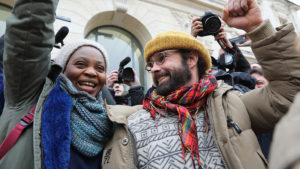Good Samaritans or criminals? France wrestles with fate of those helping migrants
IT WAS A SPLIT-SECOND DECISION that would land Pierre-Alain Mannoni in court facing charges normally associated with human trafficking.
Returning home from an evening out in La Roya — rugged, mountainous back country near his home in Nice, inland from the Mediterranean Sea — his friends invited him to see an old building appropriated by activists and NGOs.
They were using the space to shelter migrants, mainly from Sudan and Eritrea, who had crossed the nearby Italian border. (This story was published in the Toronto Star on 23 Jan. 2017)

Cédric Herrou emerges from Nice Tribunal /Photo ©Valery Hache / AFP
With more than 50 people in the abandoned SNCF railway building, they were running out of space. Mannoni was asked if he could take some people back to Nice for medical care.
“I hesitated because I was working the next day, but when I saw them the answer was clear. Three Eritrean girls appeared. They were all badly injured, one wearing a cast, another could barely walk. They had come by foot. You could see they were cold, frightened and in pain. They needed help.”
They didn’t make it far. Stopped at the highway toll booth, Mannoni was arrested under Article L622-1 of France’s immigration law. It says anyone who “facilitates or attempts to facilitate the illegal entry, movement or residence of a foreigner in France shall be punished by imprisonment for five years and a fine of €30,000.”
Often referred to as the “crime of solidarity,” the law has been used to prosecute people who support migrants and asylum-seekers. Rights group Gisti says it has documented a rise in the number of such cases going to court. Earlier this month, more than 100 NGOs, charities and labour unions signed a manifesto calling for an end to the criminalization of what they say is humanitarian activity.
“What we’re seeing is that all of the cases have one purpose,” says Claudia Charles, a legal expert at Gisti, “and that’s to discourage any kind of support for the foreign population, be they migrants, Roma or asylum-seekers.”
Interior Minister Bruno Le Roux said that if no one profits from the activity, there is no crime of solidarity. “So I can tell you that for all the cases being pursued, in court, they’re cases where we believe there is a violation of the law.”
The lack of profit was crucial for Mannoni. The 45-year-old engineer and geography professor was acquitted last week thanks to another legal clause stipulating that one must benefit from the transaction — a clear reference to human trafficking.
However, the prosecution has appealed and called for a six-month prison term.
Rights organizations say they have also documented a number of cases in which people supporting migrants have been prosecuted under other laws, including assault, defamation and “insulting public officials.”

